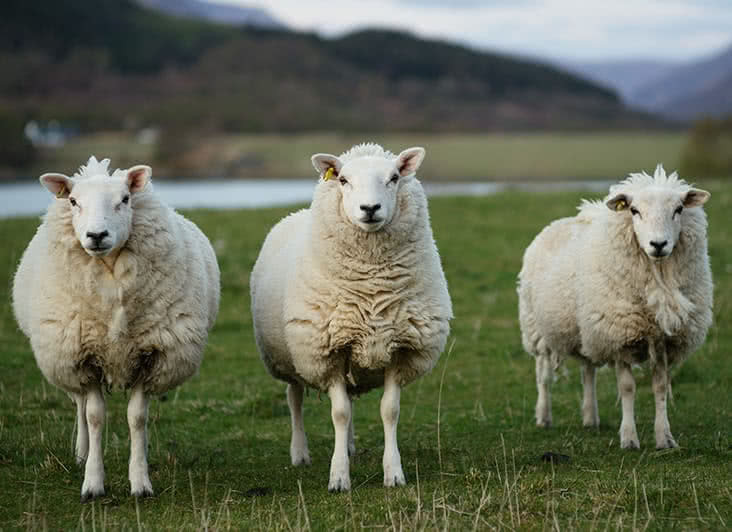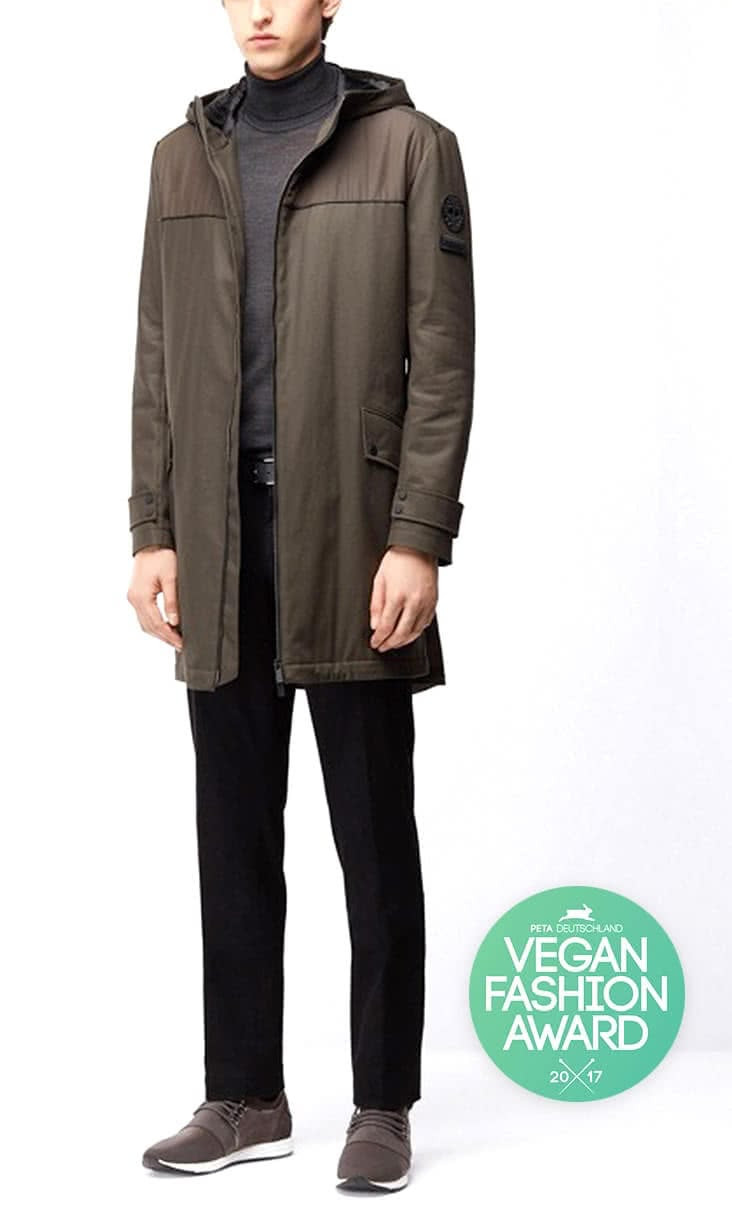Animal Welfare

HUGO BOSS strictly adheres to recognized animal and species-protection requirements such as the Convention on International Trade in Endangered Species of Wild Fauna and Flora (CITES). We also follow the guidelines of the World Organization for Animal Health (OIC) and recognize the five domains model, developed in 1994 by Professor David Mellor and Dr. Cam Reid, as a guiding principle for animal welfare. The five domains define minimum requirements for physical factors, but above all the mental state related to animal husbandry. In order to meet the recognized requirements of animal and species protection, HUGO BOSS has published an Animal Welfare Policy. The company drafted this with the help of the Animal Welfare Policy Development Guidelines in Textiles from the global animal welfare organization FOUR PAWS. The company's own measures, which have already been implemented, were also taken into account.
As a natural material, animal materials have a wide range of positive qualities, which is why these fibers are used in our products. If quality and performance are in line, we are also open to substitutes. That is why we are looking for alternatives and testing them. Unfortunately, according to our research, no materials are yet available on the market that have the same specific qualities as the animal materials we use and which meet our high quality standards. We currently see the use of recycled animal materials as an alternative to reducing the production of new animal materials. However, we will continue to examine whether individual animal materials can be reduced or excluded.
In addition, we have collaborated with animal welfare organizations such as People for the Ethical Treatment of Animals (PETA) for many years to achieve improvements in animal welfare.
For our commitment to completely replace animal materials with vegan alternatives in selected styles, we were already honored with the Vegan Fashion Award by PETA Germany in 2017 and 2025. In 2020, we presented the first BOSS Menswear vegan suit that PETA Germany certified with the “PETA-Approved Vegan” label.


Leather
-
Use at HUGO BOSS
Due to its luxurious appearance and high durability, leather is used in many HUGO BOSS products – for example, in jackets, shoes, bags, and accessories. In 2024, leather comprised 4% of all our materials used.
-
Animal welfare aspects
HUGO BOSS uses only selected leather types. We are committed to using only skins and fur from sheep, goats, cattle and buffalo, which are by-products of the food industry. The use of leather also has environmental aspects, such as in the tanning process – read more about this under materials.
-
Measures
In late 2016, HUGO BOSS stopped using farmed furs and exotic leather types. Instead, we exclusively use cattle, goat, sheep and buffalo leather, which is a by-product of the food industry. We also use vegan imitations in selected styles.
Wool
-
Use at HUGO BOSS
HUGO BOSS uses high-quality types of wool, such as Merino and cashmere, for its knitwear, suits, slacks, and more. This natural material has many positive properties: it is thermo-regulating, soft to the skin, and especially durable. In 2024, wool comprised 7% of all our materials used.
-
Animal welfare aspects
Wool is one of the most important fibers obtained from animals for the textile production. The process of responsible wool sourcing includes responsible sheep farming, gentle shearing of the animals, and especially, avoidance of the painful mulesing process. At HUGO BOSS, we are continually working to increase the use of mulesing-free wool. We only use 100% verified mulesing-free wool in our purely woolen knitted products. 53% of the wool used at HUGO BOSS is currently mulesing-free. Furthermore, by 2030, we aim to use, exclusively, mulesing-free wool in our products. We have made this intention - to expand the use of mulesing-free wool - clear once again by signing the “Brand Letter of Intent” of the animal welfare organization FOUR PAWS. In addition, we use wool from regenerative agriculture, where animal welfare also plays an important role.
-
Measures
The HUGO BOSS Animal Welfare Policy describes all the requirements of responsible wool procurement and especially considers animal welfare aspects, as mentioned above.
The greatest challenge at the moment is the availability of responsible wool that meets the high quality standards of HUGO BOSS. Together with various initiatives such as the Responsible Wool Standard (RWS), ZQ-Merino, the National Wool Declaration from AWEX as well as NATIVA and many other smaller organizations, HUGO BOSS is continuously increasing its share of responsible procurement.
In addition, we have been working with the Aid by Trade Foundation to develop "The Good Cashmere Standard". It is the first standard for the procurement of cashmere fibers that is dedicated to promoting animal welfare.
In another animal welfare measure, HUGO BOSS banned the use of angora wool completely, because its production normally involves procedures that are extremely painful to the animals.
Down
-
Use at HUGO BOSS
This special kind of feather is popular due to its thermo-regulating properties. As such, it is used primarily for outerwear products at HUGO BOSS. In 2024, down comprised less than 0,1% of all our materials used.
-
Animal welfare aspects
Here, as well, animal welfare is crucial. Forced feeding and live plucking pose special problems.
-
Measures
Starting with our fall/winter collection 2016, HUGO BOSS exclusively uses down that is produced without live plucking or forced feeding and has documented origins. 100% of the down used is certified according to DOWNPASS or is recycled.
Other animal-based fibers
-
Alpaca
When using alpaca fibers, we make sure both the welfare of the alpacas and appropriate management of land are prioritized. Therefore, only fiber certified according to the Responsible Alpaca Standard is used in our more sustainable styles.
-
Cashmere
HUGO BOSS helped to develop the Good Cashmere Standard® from Aid by Trade Foundation. It is the world’s first standard for sourcing responsibly produced cashmere fibers. In products with more than 60% cashmere content, we aim to only use certified cashmere as a standard. For 2024, this was already the case for 78% of these products.
-
Mohair
In 2024, mohair comprised less than 0,1 % of all our materials used. At HUGO BOSS, we only use mohair that comes from Responsible Mohair Standard (RMS) certified sources. The RMS stands for species-appropriate goat husbandry in mohair production. In addition to animal welfare aspects, it also addresses a more sustainable approach to the environment.
-
Silk
We are aware that silk production is critical in terms of animal welfare. Its use at HUGO BOSS is extremely low: just 0.1% of all materials used. Where possible, we work with alternative, plant-based textiles that are comparable to conventional silk. These include, for example, modal or tencel, both of which are derived from wood fibers.
Transparency & Traceability
Together with our Tier 1 and Tier 2 suppliers of animal origin, we are working to further increase supply chain transparency. We require our partners to regularly share evidence that they meet animal welfare standards. HUGO BOSS favors standards that have a chain-of-custody system, in order to demonstrate animal welfare at farm level. Products certified according to the DOWNPASS standard can be traced back to farms through an individual verification number. Besides, our regenerative agriculture materials can be trailed back to the farmer organizations. 80% of our leather products are already certified according to the Leather Working Group (at least LWG Silver) or a comparable standard, with the LWG committed to increasing transparency in the leather supply chain.
Materials of animal origin certified according to recognized standards are an important way for us to procure raw materials in line with our high animal welfare standards. We are aware that even these do not 100 percent guarantee that all specifications are met on site. Therefore, we remain in close contact with our partners and organizations, and also support, for example, on-site farm inspections.